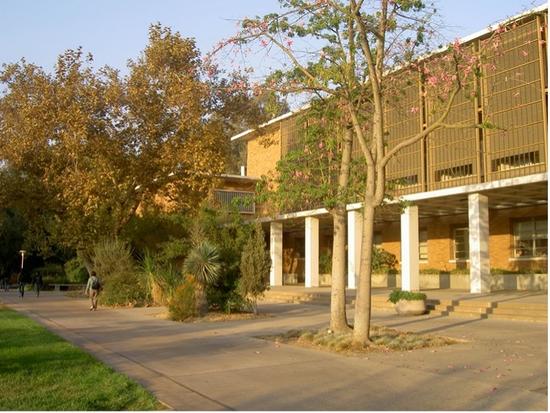Supporting Graduate Students' Academic and Professional Success

Did you know that more than half of UCR undergraduates are the first in their family to attend college? This makes me proud to be a Highlander, and as a teaching assistant, I embrace the responsibility of serving first-generation college students. But it’s also one of the most challenging things that I do.
First-generation college students face unique academic, financial, and psychological struggles. At UCR, many first-generation college students also come from low-income households (44% of UCR undergrads) or under-represented racial or ethnic groups (58%), which leads to intersectional challenges. These intersectional challenges can hinder students’ ability to take advantage of all the opportunities available to them in higher education. Here are some tips and strategies for helping first-generation students navigate college.
[Image Description: An academic building and walkway on the UCR campus.]
Pictured: Unfamiliar environments, such as colonnades fronting academic buildings on university campuses, often leave first-generation students feeling out of place.
1. Build Rapport
You might be a first-generation student yourself. But as a graduate student and a teaching assistant, you have an immense amount of knowledge about how colleges and universities work. You can share that experience with first-generation students, helping them with things like course selection or which office on campus to contact if they have a policy concern. Even having conversations about the culture of academia can help students connect and adapt to life in college.
2. Provide Guidance
First-generation students rarely self-identify in fear of being perceived as deficient or under-estimated by peers and instructors. As you build rapport with students, they might share questions about university life. For example, many first-generation students don’t know that they can withdraw from courses for health reasons, what office hours are, or how to navigate course enrollment. Even more confusing for first-generation students is what university policies have exceptions, and which do not.
Especially when teaching lower-division courses, making sure to explain what resources are available and how to access them can help students adjust to an unfamiliar environment. Sharing your own experiences as an undergraduate with choosing a major and enrolling in courses can help students navigate the requirements they are being asked to meet. And outside the classroom, you can connect students to mentorship resourcesand opportunities.
3. Share Resources for Psychological and Financial Challenges
You can also connect first-generation students with other resources on campus. Many first-generation students don’t know how to navigate the campus health center, that psychological and counseling services are available, or that the R’pantry and The Well can support them through food insecurity. You can also help them develop study skills by connecting them to the Academic Resource Center and by building opportunities for feedback and basic skills development into your discussion or laboratory section.
[Image description: A college student wearing graduation robes.]
Pictured: Your mentorship and support helps first-generation students complete their undergraduate degrees.
4. Offer Mentorship and Career Advice
First-generation students have many reasons for attending college. Some connect college degree attainment to family or community values, while others see college as a pathway to economic and social mobility. As a graduate student, you are an expert in your field, and you can share that industrial knowledge and experience with first-generation students, helping them choose a major, select coursework, and how to prepare and navigate graduation requirements.
First-generation college students are resilient and driven. They are rightly proud of their accomplishments in the face of unique challenges. However, they can benefit from the guidance that Teaching Assistants are uniquely able to provide. As graduate students and teachers, these are just a few examples of how you can help make a difference in the lives of first-generation students at UCR.

